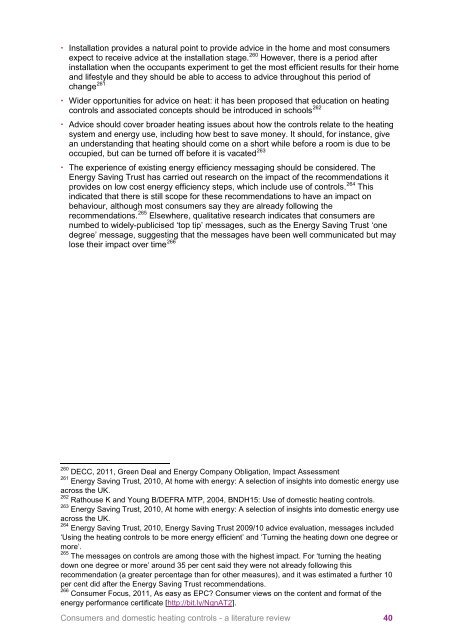Consumers-and-domestic-heating-controls-a-literature-review
Consumers-and-domestic-heating-controls-a-literature-review
Consumers-and-domestic-heating-controls-a-literature-review
Create successful ePaper yourself
Turn your PDF publications into a flip-book with our unique Google optimized e-Paper software.
� Installation provides a natural point to provide advice in the home <strong>and</strong> most consumers<br />
expect to receive advice at the installation stage. 260 However, there is a period after<br />
installation when the occupants experiment to get the most efficient results for their home<br />
<strong>and</strong> lifestyle <strong>and</strong> they should be able to access to advice throughout this period of<br />
change 261<br />
� Wider opportunities for advice on heat: it has been proposed that education on <strong>heating</strong><br />
262<br />
<strong>controls</strong> <strong>and</strong> associated concepts should be introduced in schools<br />
� Advice should cover broader <strong>heating</strong> issues about how the <strong>controls</strong> relate to the <strong>heating</strong><br />
system <strong>and</strong> energy use, including how best to save money. It should, for instance, give<br />
an underst<strong>and</strong>ing that <strong>heating</strong> should come on a short while before a room is due to be<br />
263<br />
occupied, but can be turned off before it is vacated<br />
� The experience of existing energy efficiency messaging should be considered. The<br />
Energy Saving Trust has carried out research on the impact of the recommendations it<br />
264<br />
provides on low cost energy efficiency steps, which include use of <strong>controls</strong>. This<br />
indicated that there is still scope for these recommendations to have an impact on<br />
behaviour, although most consumers say they are already following the<br />
recommendations. 265 Elsewhere, qualitative research indicates that consumers are<br />
numbed to widely-publicised ‘top tip’ messages, such as the Energy Saving Trust ‘one<br />
degree’ message, suggesting that the messages have been well communicated but may<br />
lose their impact over time 266<br />
260 DECC, 2011, Green Deal <strong>and</strong> Energy Company Obligation, Impact Assessment<br />
261 Energy Saving Trust, 2010, At home with energy: A selection of insights into <strong>domestic</strong> energy use<br />
across the UK.<br />
262 Rathouse K <strong>and</strong> Young B/DEFRA MTP, 2004, BNDH15: Use of <strong>domestic</strong> <strong>heating</strong> <strong>controls</strong>.<br />
263 Energy Saving Trust, 2010, At home with energy: A selection of insights into <strong>domestic</strong> energy use<br />
across the UK.<br />
264 Energy Saving Trust, 2010, Energy Saving Trust 2009/10 advice evaluation, messages included<br />
‘Using the <strong>heating</strong> <strong>controls</strong> to be more energy efficient’ <strong>and</strong> ‘Turning the <strong>heating</strong> down one degree or<br />
more’.<br />
265 The messages on <strong>controls</strong> are among those with the highest impact. For ‘turning the <strong>heating</strong><br />
down one degree or more’ around 35 per cent said they were not already following this<br />
recommendation (a greater percentage than for other measures), <strong>and</strong> it was estimated a further 10<br />
per cent did after the Energy Saving Trust recommendations.<br />
266 Consumer Focus, 2011, As easy as EPC? Consumer views on the content <strong>and</strong> format of the<br />
energy performance certificate [http://bit.ly/NgnAT2].<br />
<strong>Consumers</strong> <strong>and</strong> <strong>domestic</strong> <strong>heating</strong> <strong>controls</strong> - a <strong>literature</strong> <strong>review</strong> 40


